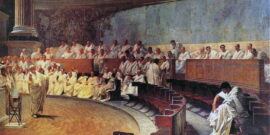We should take care lest our focus on superficial characteristics blind us to the human being beneath the surface.
America's Dysfunctional Discourse on Race
The US and UK are often described as “two nations divided by a common language,” a quip widely attributed to Winston Churchill. While it seems trite, it describes something real about both countries. It’s brought home to me even when I discuss, say, the timing of a general election. “You mean, you don’t know when it is?” is a response I’ve had multiple times over the years from American interlocutors.
The potential for mutual misunderstanding means, when Brits and Americans comment on each other’s countries, the process is fraught with danger. I do think it’s fair to say Americans have it harder, though, and for obvious enough reasons. Travel to the US, and one can perform a very inexpensive piece of magic—open a newspaper or turn on the telly and watch one’s own country disappear. The British press has a whale of a time taking pot-shots at Americans for failing to “get” Blighty on this basis. The New York Times is a favourite target, often because the errors are so egregious. No, we don’t live on mutton, and haven’t ever. Even the Welsh—Wales is the source of most of the country’s lamb—do not make it a staple of their diet.
However, that Britons are often better travelled and more worldly than Americans does not mean we are exempt from spectacularly failing to “get” the other place, which means filmmaker Martin Durkin has taken a real risk directing The Great American Race Game.
A British Sensibility
Durkin is one of the UK’s very few libertarians, in the double sense of true and faithful. American libertarians (both small and big “L”) will recognise his views, but he’s an anomaly in his homeland. The running joke here is that there are only 27 libertarians in the British Isles, every one of them weird.
Despite his politics, Durkin’s Britishness shows. The Great American Race Game examines race in the US through deeply British lenses: poverty, welfare, and class. There are times—especially in the section dealing with the War on Drugs—where it echoes films like Trainspotting. For many Americans, watching it will be a trip through the looking-glass. Their country is reflected in a funhouse mirror imported from a civilisation with a different sensibility. If it’s any consolation, this is how Brits feel when Americans try to view us through the prism of Black Lives Matter, gun laws, or abortion debates.
Those caveats in mind, Durkin’s film is nonetheless both arresting and useful. It answers one question and avoids another in ways at once enlightening and maddening. The question it answers—why black crime rates are so high relative to those not only of whites but other ethnicities—alone makes it worth watching. The question has become fraught because one of the answers currently on offer—black crime rates are so high because, statistically, blacks have lower IQs on average than whites and low intellect and violent criminality are correlated—is explosive. Its most prominent advocate is statistician and political scientist Charles Murray, and while I admire Murray’s scholarship, I think commentator Coleman Hughes is right to say that letting this claim loose on wider society may well set the country alight.
Especially if it isn’t true.
A Question Answered
In Durkin’s film, Hughes now has a powerful cinematic ally, because at its heart—although it starts as a root and branch attack on the Democratic Party—The Great American Race Game argues that black America’s current social and criminal travails are a function of culture, not intelligence. Regardless of the presence or absence of any intellectual disadvantage, Durkin argues, black America’s disproportionately high rates of violent interpersonal crime are fixable, in part because blacks have solved them before. The issues are completely separable.
Durkin achieves this feat by interviewing several distinguished American commentators—Larry Elder, Thomas Sowell, and Walter E. Williams, among others. Indeed, The Great American Race Game is a capstone to Williams’s role in public life. He died in December last year, while the film was undergoing final cinematic edits. The individual who emerges as particularly striking, however, is less well known than luminaries like Sowell or Glenn Loury. I’m speaking here of Kentucky State University statistician Wilfred Reilly, who really does have an extraordinary gift: the ability to explain complex numerical ideas in plain language.
Between 1920 and 1940, American blacks actually had the highest marriage rates of any ethnic group in the US.
It is from Reilly we learn two-parent black families are substantially less likely to be poor than single-parent white families, and that between 1900 and 1960 African Americans had low crime rates relative to their numbers in the US population. This despite the well-documented presence of genuinely racist cops and judges throughout the period. We discover, too, that between 1900 and 1955, 85 percent of black families had both parents in the home raising their children and black unemployment rates were low. Between 1920 and 1940, American blacks actually had the highest marriage rates of any ethnic group in the US.
Freed by a British filmmaker to focus on class and family structure, this disparate group of Americans replicate HMGov’s Sewell Report on racial disparities in the UK. Like Sewell and his fellow Brits, they locate the cause of disabling disadvantage and criminality in broken, fatherless homes, drugs, and poverty—not race. That said, their answers are not comforting in the same way Sewell’s are.
Thanks to its different history, Britain can use Sewell’s findings in a targeted fashion to redress deficiencies, using the kind of “keyhole” policy at which Westminster systems excel. The UK’s staggeringly successful covid-19 vaccine rollout, for example, was built on the simple fact that every single person in the country is registered with a general practitioner. The US, by contrast, is placed in the awkward position of being forced to concede that traditional claims about family structure and social organisation are correct. Because these beliefs are associated with a form of evangelical religiosity that has been politically inflammatory for Americans in ways it hasn’t in the UK (it simply no longer exists here), they have a bigger fight on their hands.
There is also the reality that those two great wars—on poverty and drugs—conducted under Uncle Sam’s aegis by administrations of both parties have been abject failures. Those wars are over: poverty and drugs won. Durkin concedes this, simply and movingly. I defy you to watch the relevant segment of the film and remain dry-eyed. If there’s a lesson for people in other countries, it’s that cack-handed, badly implemented welfare regimes are utterly pernicious and destroy the people they’re designed to help. Clearing up the wreckage of various Great Society programmes gone wrong will take years and involve immense amounts of goodwill on both sides of the aisle. I’m not alone in finding this possibility unlikely. The US is far more politically polarised than the UK; the partisanship present there makes Brexit look like a dinky toy. There’s also a quality of unreality to US politics, best captured in the film when Larry Elder casually observes that eight percent of Americans believe Elvis is still alive.
Freedom of Association
The Great American Race Game is not perfect, however, and its imperfections are, I suspect, a function of the British goggles Durkin wears. I am loath to be the reviewer who tells an auteur or writer what form his artistic output should take, but the failure to detail the causes and consequences of Barry Goldwater’s vote against the 1964 Civil Rights Act is a bad miss. Among other things, it makes American blacks look easy to bribe with taxpayer largesse. Yes, it’s true Lyndon B. Johnson’s anti-poverty programs were cynical exercises in vote grabbing and the Democratic Party was, indeed, “the party of slavery” historically.
However, it’s also true that while Goldwater’s vote against the 1964 legislation was an anguished moment rooted in his principled support for freedom of association, the southern whites who supported him in the 1964 presidential election did so because they were, by and large, racists. They would have undoubtedly rejected Goldwater’s other libertarian-ish views: his support for gays in the military, cannabis decriminalisation, and abortion rights. Meanwhile, most of the electorate simply didn’t buy it: 1964 was a Democrat landslide. The GOP, the party of Lincoln, was transformed: without Goldwater’s vote, Richard Nixon’s later “Southern Strategy” makes no sense.
By not discussing Goldwater’s voting history, Durkin is not only guilty of providing a partial history of major shifts in voting patterns. Barry Goldwater was personally less racist than Johnson, something that ought to be better known. In his first year in the Senate (1952), for example, he was responsible for the desegregation of the Senate cafeteria after he insisted his black staffer, Katherine Maxwell, be served along with every other Senate employee.
Modern viewers are thus deprived of an opportunity to assess arguments for and against freedom of association on the merits. Goldwater intuited that telling a man who to admit to his pub or bar would not stop with race, leading to civil rights law trespassing on then-unforeseen areas of private life. “No law can make one person like another if he doesn’t want to,” he told The New York Times.
Freedom of association may be a foundational liberty, but our understanding of it has so waned across the developed world we have, by and large, lost the ability to consider it intelligently. Nowhere is this clearer than in the modern transgender debate. Those gender-critical feminists currently arguing for the preservation of single-sex refuges, sports, and prisons are making a freedom of association claim. And, as should be obvious, they’re reinventing the wheel—often without any awareness that citizens of liberal democracies have had this conversation many times over in multiple jurisdictions—while they do so.
My final verdict, then: The Great American Race Game is valuable but flawed. It demolishes one bad argument and answers one pressing question, but much has been left unsaid.



